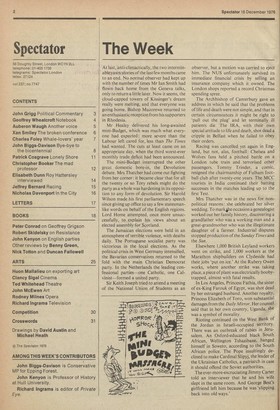The Week
At last, anti-climactically, the two interminableyawn stories of the last few months came to an end. No normal observer had kept up with the number of times Mr Ian Smith had flown back home from the Geneva talks, only to return a little later. Now it seems, the cloud-capped towers of Kissinger's dream really were melting, and that everyone was going home. Bishop Muzorewe returned to an enthusiastic reception from his supporters in Rhodesia.
Mr Healey delivered his long-awaited mini-Budget, which was much what everyone had expected : more severe than the Labour left cared for, less than The Times had wanted. The cuts at least came on an appropriate day, when the third worst-ever monthly trade deficit had been announced.
The mini-Budget interrupted the other great domestic bore-in, the Devolution debate. Mrs Thatcher had come out fighting from her corner: it became clear that for all the twenty or so Tory rebels might do the party as a whole was hardening in its opposition to any form of devolution. Sir Harold Wilson made his first parliamentary speech since giving up office to say a few statesmanlike words on behalf of the English regions. Lord Home attempted, once more unsuccessfully, to explain his views about an elected assembly for Scotland.
The Jamaican elections were held in an atmosphere of terrible violence, with deaths daily. The Portuguesesocialist party was victorious in the local elections. As the political crisis in West Germany intensified, the Bavarian conservatives returned to the fold with the main Christian Democrat party. In the Netherlands the leading con fessional parties one Catholic, one Cal vinist formed a united party.
Sir Keith Joseph tried to attend a meeting of the National Union of Students as an observer, but a motion was carried to eject him. The NUS unfortunately survived its immediate financial crisis by selling an insurance company which it owned. The London shops reported a record Christmas spending spree.
The Archbishop of Canterbury gave an address in which he said that the problems of life and death were not simple, and that in certain circumstances it might be right to 'pull out the plug' and let terminally ill patients die. The IRA, with their own special attitude to life and death, shot dead a cripple in Belfast when he failed to obey their orders.
Racing was cancelled yet again in England, but not, alas, football : Chelsea and Wolves fans held a pitched battle on a London tube train and terrorised other passengers. Tommy Trinder, a comic, resigned the chairmanship of Fulham football club after twenty-one years. The MCC tourists in India continued their batting successes in the matches leading up to the first Test.
Mrs Thatcher was in the news for nonpolitical reasons: she celebrated her silver wedding. To markilhe occasion a genealogist worked out her family history, discovering a grandfather who was a working man and a great-grandmother who was the illegitimate daughter of a farmer. Industrial disputes stopped production of t he Sunday Thnes and the Sun.
Elsewhere 1,000 British Leyland workers went on strike, and 1,000 workers at the Marathon shipbuilders on Clydeside had their jobs 'put on ice.' At the Rubery Owen works, where another strike was taking place, a piece of plant was electrically boobytrapped, almost with fatal results.
In Los Angeles, Princess Fathia, the sister of ex-King Farouk of Egypt, was shot dead by her estranged husband. Another royalty, Princess Elizabeth of Toro, won substantial damages from the Daily Mirror. Her counsel said that in her own country, Uganda, she was a symbol of morality. Rioting continued on the West Bank of the Jordan in Israeli-occupied territory. There was an outbreak of rabies in Jerusalem. An Oxford-educated black South African, Wellington Tshazibane, hanged himself in Soweto, according to the South African police. The Pope insultingly declined to make Cardinal SI ipyj, the leader of the Ukrainian Catholics, a patriarch in case it should offend the Soviet authorities.
The ever-more-excruciating Jimmy Carter told an interviewer that he and his wife slept in the same room. And George Best's girlfriend left him because he was 'slipping back into old ways.'














































 Previous page
Previous page